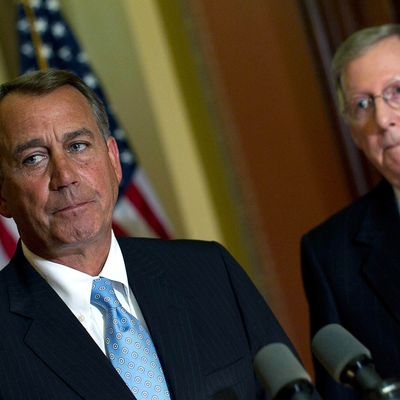
The issue that voters care about the most is the economy. The economy is doing better, and growing faster, than it was in 2012. But Democrats are doing worse in the polls.
What gives? At first blush, it is a paradox. In terms of both level and trend, the economy is much healthier than it was two years ago — and a growing economy tends to benefit incumbent parties. The unemployment rate has fallen from 7.2 percent to 5.9 percent. Economic optimism is higher than it was back then, and climbing. The economy was growing at a 2.5 percent rate midway through 2012, now it is growing at a 3.5 percent rate. That growth has pushed the budget deficit to just 2.8 percent of economic output.
But Democrats are facing something of a rout come Tuesday, likely to lose control of the Senate and to give up half a dozen or a dozen seats in the House. And pollsters and political scientists are not surprised. In fact, they say that any number of factors benefit the Republicans, relative to the Democrats. “There are a zillion reasons why 2014 is different than 2012,” said Whit Ayres, the veteran Republican pollster, predicting GOP gains.
In general, during midterms, the president’s party loses seats in both houses. Over the past 80 years, for instance, the president’s party has lost on average two dozen House seats and four Senate seats. The president’s party has gained seats in only two midterm elections since 1946. Those deep-seated trends look likely to continue this year.
In part, that is because the 2014 map just is not that favorable to Democrats, who have fewer politicians running in safe districts. Furthermore, the demographics of midterm voting tend to favor Republicans. The cohort of Americans who tend to show up for midterm elections tends to be smaller and tends to skew older, richer, and whiter — with the black, single-mother, Latino, and younger voters who bolster the Democratic base opting to stay home. “The generic ballot is far more favorable for Republicans, and the demographics are more favorable for Republicans in midterm than in general elections,” Ayres said.
But that still does not explain why the improving economy is not buoying Democratic candidates.
In part the reason seems to be that among likely midterm voters, the improving economy does not feel much like an improving economy. The stock market is booming and corporations are swimming in cash, but average families remain strapped. Household incomes are stagnant, after all — and median income growth tends to be a strong predictor of electoral outcomes. Unemployment remains high compared to where it was before the financial crisis. “People don’t perceive the economy getting better,” Ayres said. “And an overwhelming proportion see the economy as staying better or getting worse.”
The polls are dissonant on the matter, to be fair. In one recent survey, a large majority of voters described the economy as poor or very poor. But in another, respondents’ economic optimism had improved of late, with Americans about as happy as they have been since midway through 2013.
But one way or another, the numbers are not great. And any recent uptick in growth might be too little, too late, to filter through to political perceptions. “What seems to be true at the moment is that faster economic growth has not really shown up in presidential approval yet,” said John Sides, a political scientist at George Washington University. “Why that’s true is interesting. Maybe there’s a lag. Maybe there are other factors at work,” he said, including the famed “six-year swoon,” as presidents lose support the longer they have been in office.
Why would Sides be talking about presidential approval though, rather than party approval, in terms of the midterms? That is because voters tend to focus more on their feelings about the man in charge than their feelings about the economy when it comes to midterm elections — more precisely, voters tend to filter their economic feelings through their feelings about the president.
As such, in general, the state of the economy matters less in midterm elections than it does in general elections. The political scientist Lynn Vavreck, for instance, finds that economic growth in the first six months of a presidential election year strongly correlates with the vote share of the president’s party. But during midterm elections, that correlation is much, much weaker. “There is a strong relationship between the nation’s growth rate and presidential vote share, but no relationship between the nation’s growth rate and Senate (or House) seat loss in midterm years,” she wrote this week.
But presidential approval does matter when it comes to how many Congressional seats his party loses or gains. There, the numbers look very ugly for Democrats. In one recent survey of likely voters in battleground states, about three in five disapproved of the president’s economic leadership. And in battleground states, Obama’s approval rate is below 40 percent.
Sides also noted that the news in general has been negative recently: Ebola, Syria, Iraq, death, and beheadings have dominated the headlines. Though it is hard to see it in the numbers, those events might further weigh on Americans’ confidence in the incumbent party, he said. “There hasn’t been a good week in a long time,” he said.
It all adds up to an election where Democrats face a tough series of elections — and where the improving economy will do little to help them.





























